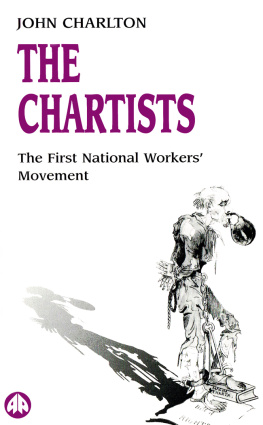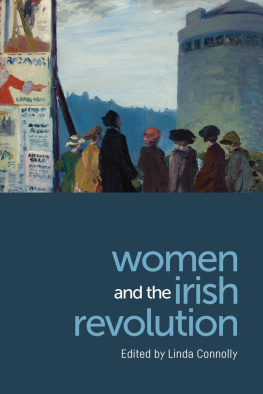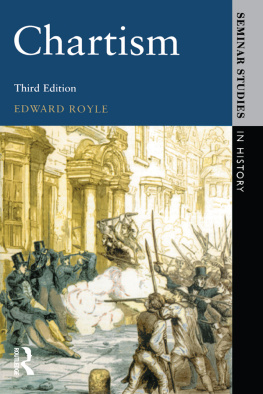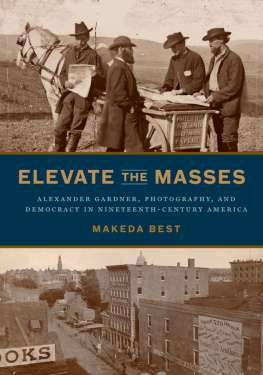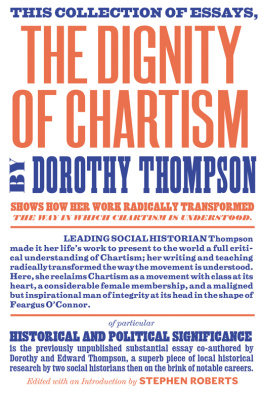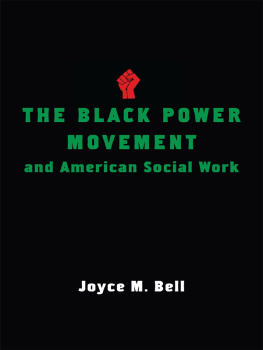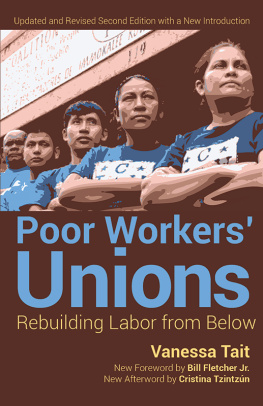The Chartists
A Socialist History of Britain
Series edited by the Northern Marxist Historians Group
John Callaghan,Great Power Complex: British Imperialism, International Crises and National Decline 19141951
Brian Manning,Aristocrats, Plebeians and Revolution in England, 16401660
John Newsinger,Fenianism in Mid-Victorian Britain
John Saville,The Consolidation of the Capitalist State, 18001850
Ellen Meiksins Wood and Neal Wood,A Trumpet of Sedition: Political Theory and the Rise of Capitalism, 15091688
First published 1997 by Pluto Press
345 Archway Road, London N6 5AA
and 1436 West Randolph
Chicago, Illinois 60607, USA
Copyright John Charlton 1997
The right of John Charlton to be identified as the author of this work has been asserted by him in accordance with the Copyright, Designs and Patents Act 1988.
British Library Cataloguing in Publication Data
A catalogue record for this book is available from the British Library
ISBN 0 7453 1182 2 hbk
ISBN 9781783719419 Kindle eBook
ISBN 9781783719402 EPUB eBook
Library of Congress Cataloging in Publication Data
Charlton, John, 1938
The Chartists: the first national workers movement/John Charlton.
p. cm. (Socialist history of Britain)
Includes bibliographical references and index.
ISBN 0745311822
1. Chartism. 2. Labor movementGreat BritainHistory19th century. I. Title. II. Series.
HD8396.C48 1997
322'.2'0941 dc20
9634396
CIP
2001 2000 1999 1998 1997 5 4 3 2 1
Designed and produced for Pluto Press by
Chase Production Services, Chadlington, OX7 3LN
Typeset by Stanford DTP Services, Milton Keynes
Printed in the EC by J.W. Arrowsmith Ltd, Bristol, England
Acknowledgements
My thanks must go first to the dozens of authors more expert than me whose work I have looted to produce this book. Of course it is a tribute to the importance of the Chartists that so many writers have sought to uncover the tiniest part of their story. It is now possible to find accounts of the movement in almost all regions of Britain, to read biographies of all the main figures and some of the minor ones, and to learn about the language, the dress codes and symbols and the activities of teetotal Chartists, Chartist educators, Christian Chartists, Chartist trade unionists, Chartists in America, Irish Chartists, Chartist prisoners and female Chartists. Less anonymously, I have to thank Mike Haynes, David McNally, Raymond Challinor, Mick Charlton, Keith Flett, Donnie Gluckstein, Sally Mitchison and, above all, John Saville.
Introduction
Between 1838 and 1848 the Chartist movement drew thousands of people into political activity. Some of its national leaders and most of its local leaders were working men. Its mass circulation weekly newspaper, the Northern Star, speaking consistently to workers concerns, had a massive working-class readership. Many of its local groups, reaching towards party organisation, drew on the experience of trade unionism. In its moments of maximum impact, in 1839, 1842 and 1848, it mobilised hundreds of thousands of workers, uniting spinners, weavers, miners, engineers, farm labourers, bricklayers, carpenters, navvies, seamen, dockers, tailors, shoemakers, blacksmiths and printers. The victims of the states vengeance against the movement those imprisoned and those transported were overwhelmingly working-class. Chartism was the first national workers movement in history.
In the second quarter of the nineteenth century the problems brought by industrialisation were bearing very heavily upon workers lives. The domestic system of production in many industries was in its death throes and its remaining workers were suffering rapidly declining living standards. The refugees of the handicraft sector joined displaced farm workers and Irish immigrants in servicing the new factories, iron-works and coal-mines. In the new factory sector, operatives faced working days of up to 18 hours for barely subsistence wages. They were subjected to brutal discipline in extremely inhospitable surroundings mere hands to manipulate the expanding and unsafe world of machines. The widespread employment of children, from five years of age, robbed them of their childhood and contributed to a life expectancy, for some groups, of as low as the late teens.
These work people were sucked into a new urban environment of almost unspeakable horror. Hurriedly built ramshackle cottages and the wet and lightless cellars of tenement blocks served as billets for the new arrivals. Devoid of heating, cooking facilities and adequate sanitation, such buildings sometimes sat beneath the factory walls, repositories of overcrowding, domestic and community violence, and rampant disease.
It was workers from such milieux who formed the shock troops of the burgeoning mass movements of 1839, 1842 and 1848. They joined with artisans and members of the lower middle class, many of whom were the carriers of a long tradition of English working-class radicalism. This was a tradition stretching back into the eighteenth century and one which had made serial, but temporary, contact with the plebeian masses. It was a tradition which had been given direction and vitality in the 1790s in the acute polarities of response to the great French Revolution. The Corresponding Societies, in proclaiming their desire for members unlimited, carried political discourse far beyond the usual social groups, taking up and transmitting the hard egalitarian politics of Thomas Paine.
Their successors enthusiastically embraced a myriad of ideas: from Thomas Spence, the idea of public ownership of land; from Robert Owen, a restructuring of society along communitarian lines and all-embracing trade unionism; from Thomas Hodgkin and others, a socialism based on the labour theory of value; and from William Cobbett, a devastating attack on Old Corruption and the values of industrial society.
Imbued with an array of anti-establishment ideologies, working-class radicals moved into a series of campaigns, in some of them engaging with a mass of workers beyond their ranks. There were Short Time Committees, the gigantic and bitter opposition to the New Poor Law, the fight to establish a free radical press, and the angry struggle to free the Tolpuddle Martyrs and the Glasgow Cotton Spinners. Running through the whole period, often just beneath the surface, then breaking out into mass action, was the demand for franchise reform. The Peterloo Massacre of 1819, which occurred in the course of one such campaign, was an indelible reminder of the systems inequality and injustice. Working men and women had risen to the banner of parliamentary reform again between 1830 and 1832, only to be sharply reminded of their exclusion with the Reform Act of 1832. In a decade of rising tensions, social, economic and political, the drawing up and publishing of the Peoples Charter in 1838 proved to be the catalyst for pent-up frustrations. The six points were expressly political. The movement they inspired was much more. As Engels noted in The Condition of the Working Class in England in 1844, Chartism was of an essentially social nature, a class movement:
The Six Points which for the radical bourgeoisie are the beginning and end of the matter, which are meant, at the utmost, to call forth certain further reforms of the Constitution, are for the proletarian, a mere means to further ends. Political power our means, social happiness our end is now the clearly formulated war-cry of the Chartists. The knife and fork question of the preacher Stephen was a truth for a part of the Chartists only, in 1838; it is a truth for all of them in 1845.


